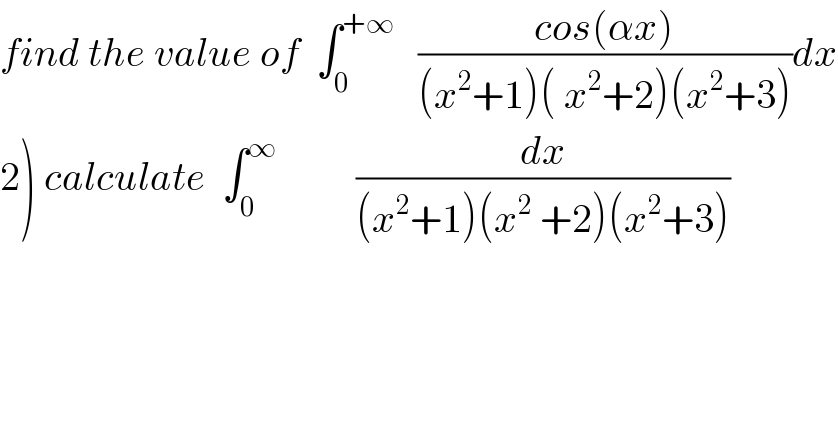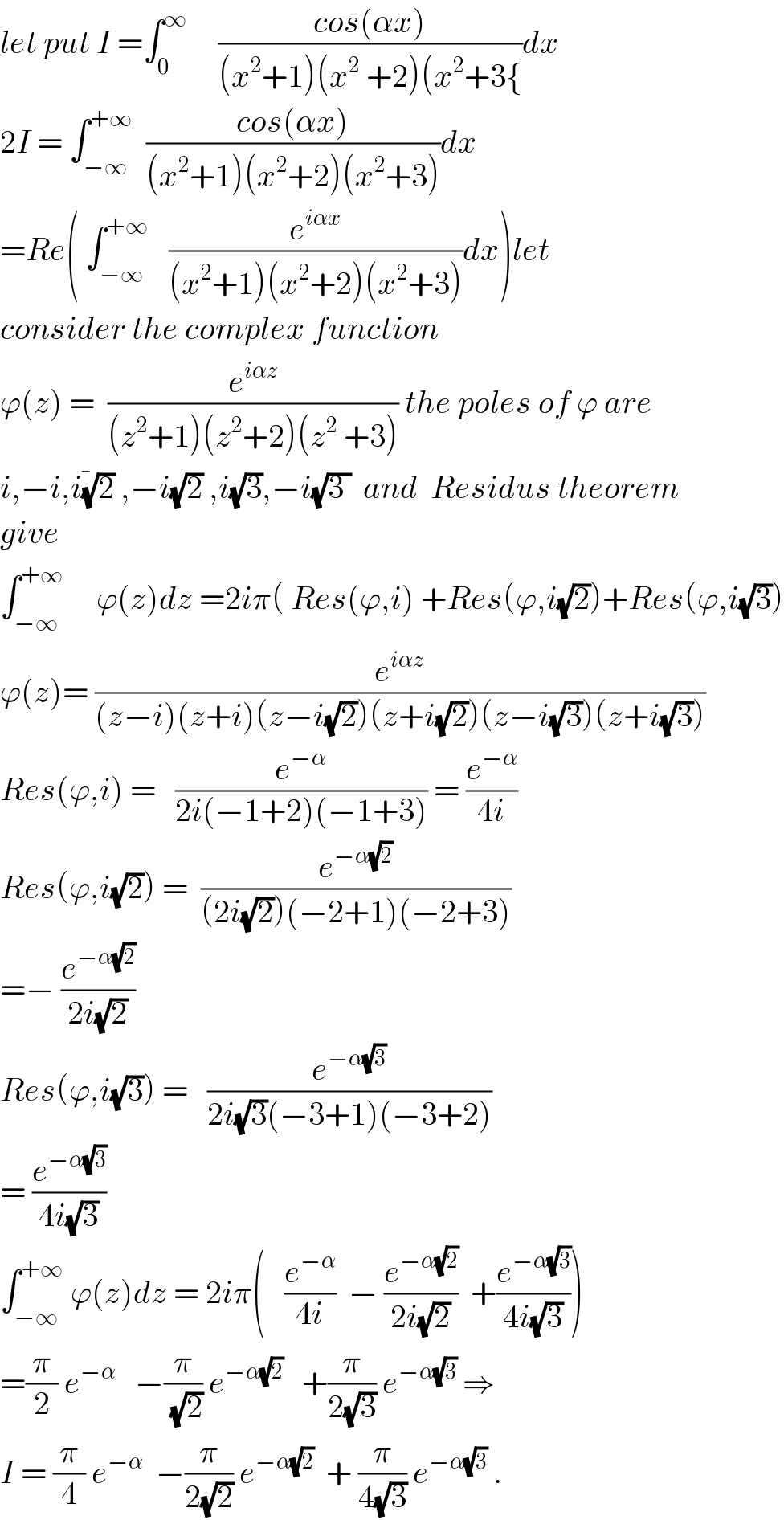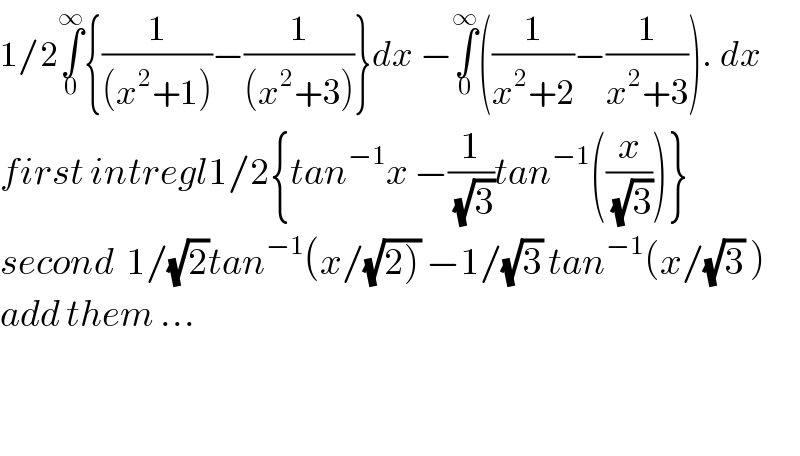
Question Number 34021 by prof Abdo imad last updated on 29/Apr/18

$${find}\:{the}\:{value}\:{of}\:\:\int_{\mathrm{0}} ^{+\infty} \:\:\:\frac{{cos}\left(\alpha{x}\right)}{\left({x}^{\mathrm{2}} +\mathrm{1}\right)\left(\:{x}^{\mathrm{2}} +\mathrm{2}\right)\left({x}^{\mathrm{2}} +\mathrm{3}\right)}{dx} \\ $$$$\left.\mathrm{2}\right)\:{calculate}\:\:\int_{\mathrm{0}} ^{\infty} \:\:\:\:\:\:\:\:\:\:\frac{{dx}}{\left({x}^{\mathrm{2}} +\mathrm{1}\right)\left({x}^{\mathrm{2}} \:+\mathrm{2}\right)\left({x}^{\mathrm{2}} +\mathrm{3}\right)} \\ $$
Commented by prof Abdo imad last updated on 30/Apr/18

$${let}\:{put}\:{I}\:=\int_{\mathrm{0}} ^{\infty} \:\:\:\:\:\frac{{cos}\left(\alpha{x}\right)}{\left({x}^{\mathrm{2}} +\mathrm{1}\right)\left({x}^{\mathrm{2}} \:+\mathrm{2}\right)\left({x}^{\mathrm{2}} +\mathrm{3}\left\{\right.\right.}{dx} \\ $$$$\mathrm{2}{I}\:=\:\int_{−\infty} ^{+\infty} \:\:\frac{{cos}\left(\alpha{x}\right)}{\left({x}^{\mathrm{2}} +\mathrm{1}\right)\left({x}^{\mathrm{2}} +\mathrm{2}\right)\left({x}^{\mathrm{2}} +\mathrm{3}\right)}{dx} \\ $$$$={Re}\left(\:\int_{−\infty} ^{+\infty} \:\:\:\frac{{e}^{{i}\alpha{x}} }{\left({x}^{\mathrm{2}} +\mathrm{1}\right)\left({x}^{\mathrm{2}} +\mathrm{2}\right)\left({x}^{\mathrm{2}} +\mathrm{3}\right)}{dx}\right){let}\: \\ $$$${consider}\:{the}\:{complex}\:{function} \\ $$$$\varphi\left({z}\right)\:=\:\:\frac{{e}^{{i}\alpha{z}} }{\left({z}^{\mathrm{2}} +\mathrm{1}\right)\left({z}^{\mathrm{2}} +\mathrm{2}\right)\left({z}^{\mathrm{2}} \:+\mathrm{3}\right)}\:{the}\:{poles}\:{of}\:\varphi\:{are} \\ $$$${i},−{i},{i}\sqrt[{�}]{\mathrm{2}}\:,−{i}\sqrt{\mathrm{2}}\:,{i}\sqrt{\mathrm{3}},−{i}\sqrt{\mathrm{3}\:}\:\:{and}\:\:{Residus}\:{theorem} \\ $$$${give} \\ $$$$\int_{−\infty} ^{+\infty} \:\:\:\:\:\varphi\left({z}\right){dz}\:=\mathrm{2}{i}\pi\left(\:{Res}\left(\varphi,{i}\right)\:+{Res}\left(\varphi,{i}\sqrt{\mathrm{2}}\right)+{Res}\left(\varphi,{i}\sqrt{\mathrm{3}}\right)\right. \\ $$$$\varphi\left({z}\right)=\:\frac{{e}^{{i}\alpha{z}} }{\left({z}−{i}\right)\left({z}+{i}\right)\left({z}−{i}\sqrt{\mathrm{2}}\right)\left({z}+{i}\sqrt{\mathrm{2}}\right)\left({z}−{i}\sqrt{\mathrm{3}}\right)\left({z}+{i}\sqrt{\mathrm{3}}\right)} \\ $$$${Res}\left(\varphi,{i}\right)\:=\:\:\:\frac{{e}^{−\alpha} }{\mathrm{2}{i}\left(−\mathrm{1}+\mathrm{2}\right)\left(−\mathrm{1}+\mathrm{3}\right)}\:=\:\frac{{e}^{−\alpha} }{\mathrm{4}{i}} \\ $$$${Res}\left(\varphi,{i}\sqrt{\mathrm{2}}\right)\:=\:\:\frac{{e}^{−\alpha\sqrt{\mathrm{2}}} }{\left(\mathrm{2}{i}\sqrt{\mathrm{2}}\right)\left(−\mathrm{2}+\mathrm{1}\right)\left(−\mathrm{2}+\mathrm{3}\right)} \\ $$$$=−\:\frac{{e}^{−\alpha\sqrt{\mathrm{2}}} }{\mathrm{2}{i}\sqrt{\mathrm{2}}} \\ $$$${Res}\left(\varphi,{i}\sqrt{\mathrm{3}}\right)\:=\:\:\:\frac{{e}^{−\alpha\sqrt{\mathrm{3}}} }{\mathrm{2}{i}\sqrt{\mathrm{3}}\left(−\mathrm{3}+\mathrm{1}\right)\left(−\mathrm{3}+\mathrm{2}\right)} \\ $$$$=\:\frac{{e}^{−\alpha\sqrt{\mathrm{3}}} }{\mathrm{4}{i}\sqrt{\mathrm{3}}} \\ $$$$\int_{−\infty} ^{+\infty} \:\varphi\left({z}\right){dz}\:=\:\mathrm{2}{i}\pi\left(\:\:\:\frac{{e}^{−\alpha} }{\mathrm{4}{i}}\:\:−\:\frac{{e}^{−\alpha\sqrt{\mathrm{2}}} }{\mathrm{2}{i}\sqrt{\mathrm{2}}}\:\:+\frac{{e}^{−\alpha\sqrt{\mathrm{3}}} }{\mathrm{4}{i}\sqrt{\mathrm{3}}}\right) \\ $$$$=\frac{\pi}{\mathrm{2}}\:{e}^{−\alpha} \:\:\:−\frac{\pi}{\sqrt{\mathrm{2}}}\:{e}^{−\alpha\sqrt{\mathrm{2}}} \:\:\:+\frac{\pi}{\mathrm{2}\sqrt{\mathrm{3}}}\:{e}^{−\alpha\sqrt{\mathrm{3}}} \:\Rightarrow \\ $$$${I}\:=\:\frac{\pi}{\mathrm{4}}\:{e}^{−\alpha} \:\:−\frac{\pi}{\mathrm{2}\sqrt{\mathrm{2}}}\:{e}^{−\alpha\sqrt{\mathrm{2}}} \:\:+\:\frac{\pi}{\mathrm{4}\sqrt{\mathrm{3}}}\:{e}^{−\alpha\sqrt{\mathrm{3}}} \:. \\ $$
Commented by abdo imad last updated on 30/Apr/18

$$\left.\mathrm{2}\right)\:{let}\:{take}\:\alpha=\mathrm{0}\:\Rightarrow \\ $$$$\int_{\mathrm{0}} ^{\infty} \:\:\:\:\:\frac{{dx}}{\left({x}^{\mathrm{2}} +\mathrm{1}\right)\left({x}^{\mathrm{2}} +\mathrm{2}\right)\left({x}^{\mathrm{2}} +\mathrm{3}\right)}\:=\frac{\pi}{\mathrm{4}}\:−\frac{\pi}{\mathrm{2}\sqrt{\mathrm{2}}}\:+\frac{\pi}{\mathrm{4}\sqrt{\mathrm{3}}}\:. \\ $$
Answered by tanmay.chaudhury50@gmail.com last updated on 30/Apr/18

$$\underset{\mathrm{0}} {\overset{\infty} {\int}}\frac{\mathrm{1}}{\left({x}^{\mathrm{2}} +\mathrm{3}\right)}.\frac{\left({x}^{\mathrm{2}} +\mathrm{2}\right)−\left({x}^{\mathrm{2}} +\mathrm{1}\right)}{\left({x}^{\mathrm{2}} +\mathrm{2}\right)\left({x}^{\mathrm{2}} +\mathrm{1}\right)}{dx} \\ $$$$\underset{\mathrm{0}} {\overset{\infty} {\int}}\frac{\mathrm{1}}{\left({x}^{\mathrm{2}} +\mathrm{3}\right)}.\frac{\mathrm{1}}{\left({x}^{\mathrm{2}} +\mathrm{1}\right)}{dx}−\underset{\mathrm{0}} {\overset{\infty} {\int}}\frac{\mathrm{1}}{\left({x}^{\mathrm{2}} +\mathrm{3}\right)}.\frac{\mathrm{1}}{\left({x}^{\mathrm{2}} +\mathrm{2}\right)}{dx} \\ $$
Commented by tanmay.chaudhury50@gmail.com last updated on 30/Apr/18

$$\mathrm{1}/\mathrm{2}\underset{\mathrm{0}} {\overset{\infty} {\int}}\left\{\frac{\mathrm{1}}{\left({x}^{\mathrm{2}} +\mathrm{1}\right)}−\frac{\mathrm{1}}{\left({x}^{\mathrm{2}} +\mathrm{3}\right)}\right\}{dx}\:−\underset{\mathrm{0}} {\overset{\infty} {\int}}\left(\frac{\mathrm{1}}{{x}^{\mathrm{2}} +\mathrm{2}}−\frac{\mathrm{1}}{{x}^{\mathrm{2}} +\mathrm{3}}\right)._{} {dx} \\ $$$${first}\:{intregl}\mathrm{1}/\mathrm{2}\left\{{tan}^{−\mathrm{1}} {x}\:−\frac{\mathrm{1}}{\sqrt{\mathrm{3}}}{tan}^{−\mathrm{1}} \left(\frac{{x}}{\sqrt{\mathrm{3}}}\right)\right\} \\ $$$${second}\:\:\mathrm{1}/\sqrt{\mathrm{2}}{tan}^{−\mathrm{1}} \left({x}/\sqrt{\left.\mathrm{2}\right)}\:−\mathrm{1}/\sqrt{\mathrm{3}}\:{tan}^{−\mathrm{1}} \left({x}/\sqrt{\mathrm{3}}\:\right)\right. \\ $$$${add}\:{them}\:... \\ $$$$ \\ $$$$ \\ $$
